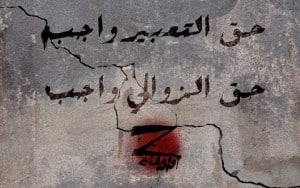On November 3, 2012, Oussema Bouajila and Chahine Berriche, two young students in the city of Gabès, belonging to the “Zwewla” movement drew tags on the walls. They were arrested by the police and, panicked, fled.
On November 5, they were summoned to the police station, and a trial was opened. On November 6, they were summoned a second time, and accused of:
Unauthorized writing on public property
Violation of the state of emergency
Propagation of false rumors likely to harm public order
Oousemma and Chahine will appear before the judge on December 5, 2012, they are currently free.
This trial aroused the interest of the media and internet users, a chain of solidarity has been forged around the two young tagers and the Zwewla movement, which aims to carry the voice of the poor and the destitute through the tags on the walls of cities and the cities.
Many people think that this trial perfectly embodies the return to censorship, undermines freedom of expression and artistic creation, and that graffiti is not a crime. It is this same slogan that is used in the solidarity campaign with the two tagers. A support committee was immediately created, mainly made up of artists, journalists, bloggers and Internet users. The latter say that such repression does not have to be in post-revolutionary Tunisia, especially since it is directed against young people, the very essence of the revolution.
On the sidelines of Carthage’s cinematographic days, a flashmob was executed in front of the Le Colisée cinema in the city center, in order to make public opinion aware of the gravity of the situation and the accuracy of the cause.
Facebook pages have also been created for this purpose, there are all the actions carried out by the Zwewla collective and those who support them, and information relating to the trial.
While waiting for the verdict, we continue to hope and proclaim loud and clear that graffiti is not a crime.








